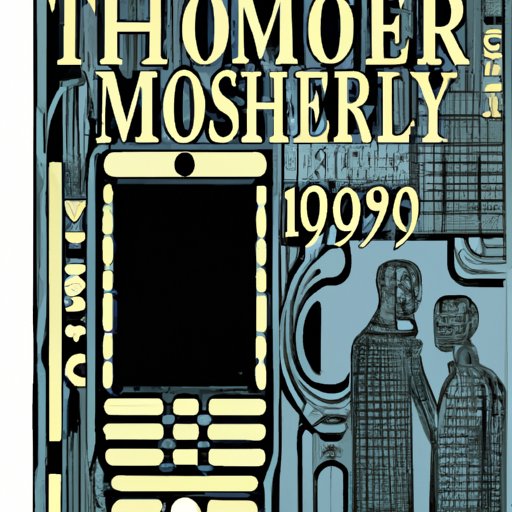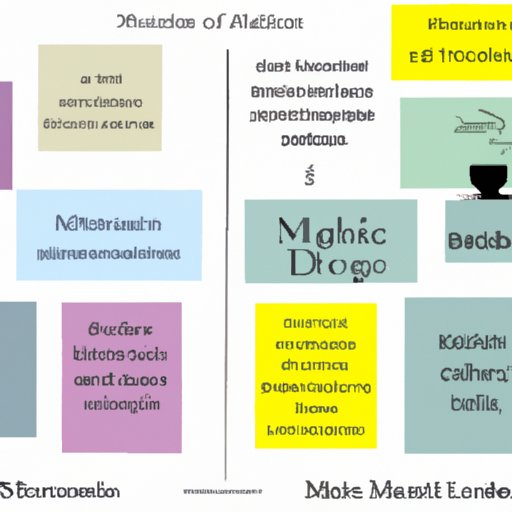Introduction
Modernist literature is a type of literature that emerged out of the rapid social, political, and technological changes occurring during the late 19th and early 20th centuries. It is characterized by its emphasis on individual experience and its exploration of themes such as alienation, loneliness, and the search for meaning and identity. In this article, we will explore the key themes and writing styles of modernist literature, investigate its influence on society, and compare and contrast it to other literary movements.

Analyzing the Key Themes of Modernist Literature
One of the main themes of modernist literature is individuality and loneliness. This theme is expressed through characters who are isolated from society, often due to their different views or beliefs. As Virginia Woolf wrote in her novel Mrs. Dalloway, “She had the oddest sense of being herself invisible; unseen; unknown; there being no more marrying, no more having of children now, but only this astonishing and rather solemn progress with the rest of them up Bond Street” (Woolf, 1925). Here, Woolf expresses the idea that individuals can feel disconnected from the world around them, even when surrounded by people.
Another key theme of modernist literature is alienation and isolation. This is often expressed through characters who are unable to connect with the world around them or are trapped in a cycle of meaningless experiences. For example, in The Great Gatsby, F. Scott Fitzgerald writes, “Gatsby believed in the green light, the orgastic future that year by year recedes before us. It eluded us then, but that’s no matter—tomorrow we will run faster, stretch out our arms farther… And one fine morning—” (Fitzgerald, 1925). Here, Fitzgerald conveys the idea that individuals can be so focused on chasing an idealized version of the future that they lose sight of the present moment.
The final key theme of modernist literature is the search for meaning and identity. This theme is often explored through characters who are struggling to make sense of their lives in a chaotic world. As T.S. Eliot writes in his poem The Waste Land, “I will show you fear in a handful of dust” (Eliot, 1922). Here, Eliot suggests that individuals can feel overwhelmed and confused by the seemingly meaningless events of everyday life.
Examining the Different Writing Styles of Modernist Authors
Modernist authors used a variety of writing styles to explore these themes. One of the most popular was stream of consciousness, which was used to convey the inner thoughts and feelings of characters. For example, James Joyce’s Ulysses uses this style to explore the protagonist’s thoughts and experiences. Another common writing style was the use of symbolism, which was used to convey deeper meanings and emotions. For instance, in The Great Gatsby, Fitzgerald uses the color green to symbolize hope and dreams.
Experimental poetry was also popular among modernist authors. This form of poetry was characterized by its use of free verse, fragmented structure, and abstract imagery. For example, T.S. Eliot’s The Waste Land is an example of experimental poetry, as it contains a variety of different poetic techniques and forms. Finally, modernist authors also experimented with narrative structure, often using non-linear narratives or fragmented stories to convey their ideas.
Exploring the Impact of Modernist Literature on Society
Modernist literature had a profound impact on society. It was instrumental in inspiring social movements such as Surrealism and Dadaism, which sought to challenge the status quo and express the innermost thoughts and feelings of individuals. Additionally, modernist literature had a strong influence on art and music. Artists such as Pablo Picasso and composers such as Igor Stravinsky were heavily influenced by modernist literature, and their works reflect its themes and writing styles.
Modernist literature also reflected the historical events of the time. World War I had a particularly strong influence on modernist authors, as it highlighted the chaos and destruction of war. Many of their works explored themes such as death, despair, and disconnection, reflecting the devastating effects of the war on individuals and societies.

Investigating the Role of Technology in Modernist Literature
Technology played an important role in modernist literature. The rapid advances in technology during this period created new opportunities for writers to explore and experiment with different forms of writing. For example, the invention of the typewriter allowed authors to quickly produce large amounts of text, while the development of radio and television allowed them to reach wider audiences. Additionally, new technologies such as photography and film provided modernist authors with new ways to convey their ideas.
Technology also had a profound impact on the themes explored in modernist literature. Writers began to explore the intersection between technology and society, often expressing their fears and anxieties about the potential consequences of new technologies. For example, Aldous Huxley’s Brave New World warns of the dangers of a technologically advanced society.

Comparing and Contrasting Modernist Literature with Other Literary Movements
Modernist literature can be compared and contrasted with other literary movements. For example, when compared to Romanticism, modernist literature is more focused on the individual experience and less concerned with traditional values and beliefs. Additionally, modernist literature is more focused on exploring the inner depths of the human psyche than Realism, which is more concerned with depicting the external world. Finally, modernist literature differs from Postmodernism in its focus on the individual experience, as Postmodernism is more concerned with deconstructing existing structures and systems.
Examining the Influence of Historical Events on Modernist Literature
Modernist literature was strongly influenced by the political, social, and technological changes of the time. World War I had a particularly strong influence on modernist authors, as it highlighted the horrors and devastation of war. Additionally, the industrial revolution and the rise of fascism had a significant impact on modernist literature, as writers explored the effects of these events on individuals and societies.
Conclusion
In conclusion, modernist literature is a type of literature that emerged out of the rapid social, political, and technological changes of the late 19th and early 20th centuries. It is characterized by its emphasis on individual experience and its exploration of themes such as alienation, loneliness, and the search for meaning and identity. Modernist authors used a variety of writing styles to explore these themes, and their works had a profound impact on society. Additionally, technology played an important role in modernist literature, providing authors with new ways to express their ideas. Finally, modernist literature can be compared and contrasted to other literary movements, such as Romanticism, Realism, and Postmodernism.
Today, modernist literature remains relevant and its themes and ideas continue to resonate with readers. Its exploration of the individual experience and its reflection of historical events provide us with insight into our own lives and the world around us. As such, modernist literature continues to shape our understanding of ourselves and our place in the world.
(Note: Is this article not meeting your expectations? Do you have knowledge or insights to share? Unlock new opportunities and expand your reach by joining our authors team. Click Registration to join us and share your expertise with our readers.)
